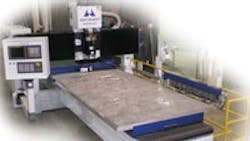A small manufacturer's ability to innovate often is constrained by a lack of resources. There's never enough people, time, or capital available to devote to planning for future growth. Instead, efforts are concentrated on addressing the here and now.
Such constraints need not deter innovation, however, as one small Tennessee manufacturer is demonstrating. Accu-Router Inc. manufactures high performance CNC routers for such industries as upholstered furniture, boating, aerospace, automotive and hardwood furniture. The 25-person firm has teamed with the University of Tennessee's Center for Industrial Services and UT-Knoxville's College of Engineering to develop design improvements its customers will embrace.
A feature of Accu-Router's machines is a high-speed spindle that rotates a cutter at speeds of up to 24,000 rpm. At that speed, it generates a lot of wood dust and debris. The company wants to continuously remove the debris from the router for the sake of cleanliness, safety and efficiency.
"In our machine tool world, tweaking productivity improvements is all about finding incremental gains," says Todd Herzog, president of Accu-Router. "In high production, such gains get magnified quickly. Our best approach to meeting global competition is through advanced productivity."
Accu-Router turned to the Center for Industrial Sciences for design improvement assistance; the center found resources at the College of Engineering. Three teams of engineering students were assigned to analyze the router's dust chip collection, router enclosure and tabletop vacuum, and propose design improvements for each. Several trips to the plant ensued.
In late April, the engineering students were scheduled to deliver final presentations on their projects, which include sharing results from testing and analysis of the production-quality prototypes developed from their proposals. Herzog fully expects the design proposals to translate into real-world improvements that give Accu-Router an additional competitive edge. "These prototypes will be enhanced as needed to reach a marketable set of new product offerings," he says.
The collaboration is a win-win situation for both Accu-Router and the university students. The manufacturer received high-quality engineering design assistance without a huge outlay of money. In addition to funding the prototypes, Herzog said the university's only other request was for the manufacturer to be readily available to answer questions or provide information.
For the students, the senior projects provide real-world experience. "It's important that our seniors have exposure to real engineering problems and learn how to apply the analytical skills they've learned in the classroom before entering the professional environment," said Don Dareing, professor of mechanical engineering. "It's a tremendous benefit for these students to see their design become reality and to work with a manufacturer."
Adds Herzog, "These three design teams have zeroed in on what Accu-Router does best to do it even better."
See Also
About the Author
Jill Jusko
Bio: Jill Jusko is executive editor for IndustryWeek. She has been writing about manufacturing operations leadership for more than 20 years. Her coverage spotlights companies that are in pursuit of world-class results in quality, productivity, cost and other benchmarks by implementing the latest continuous improvement and lean/Six-Sigma strategies. Jill also coordinates IndustryWeek’s Best Plants Awards Program, which annually salutes the leading manufacturing facilities in North America.
Have a story idea? Send it to [email protected].

